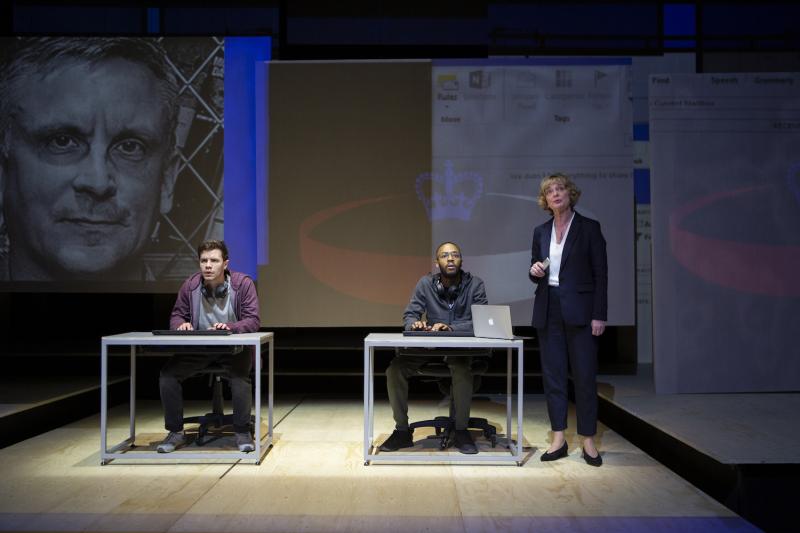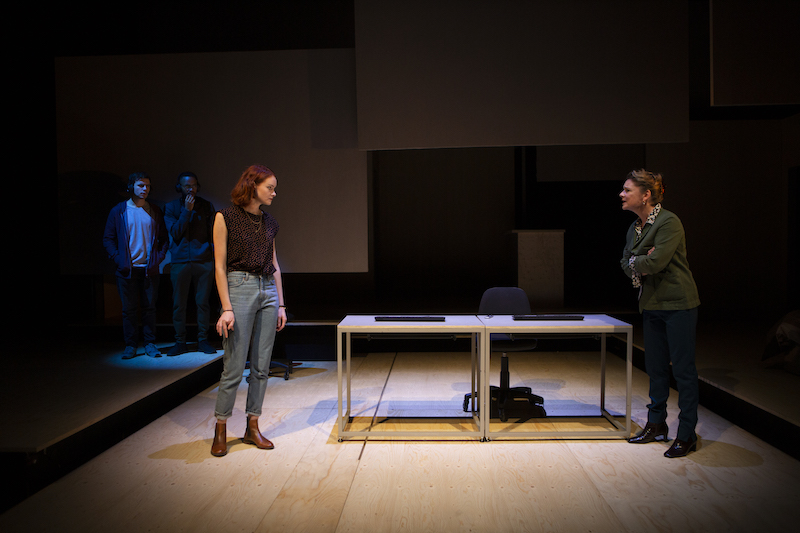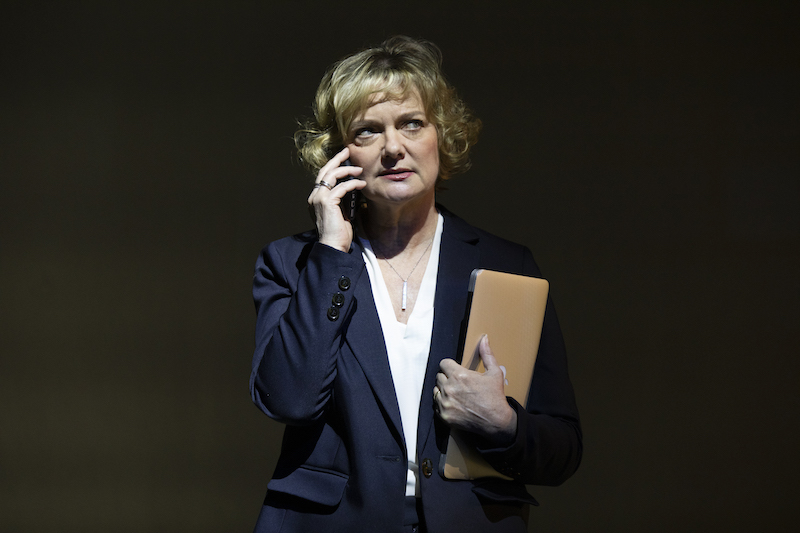The Haystack, Hampstead Theatre review - a chilling surveillance state thriller | reviews, news & interviews
The Haystack, Hampstead Theatre review - a chilling surveillance state thriller
The Haystack, Hampstead Theatre review - a chilling surveillance state thriller
This flawed but trenchant new spy drama asks who's watching the watchers

With counter-terrorism an urgent concern – and specifically how best to find, track and use the data of suspected threats, without sacrificing our privacy and civil liberties – it’s excellent timing for a meaty drama about the surveillance state.
However, you do have to wade through an overlong first half which, unfortunately, trips into every genre cliché going. The GCHQ computer whizzes who supply the security services with dubiously obtained material are nerdy, hoodie-wearing, high-IQ but socially awkward gamers. Add in an idealistic young female journalist, who falls alarmingly quickly into alcoholism and depression after a grave development in her whistleblower story, her unsupportive boyfriend and no-nonsense editor, and a shadowy conspiracy involving the British establishment and a Middle Eastern power, and you’ve got spy thriller bingo.
Now, some of that may well be representative of reality, but replicating the tropes of so many other dramas – stage and screen – means it’s far too easy for a savvy audience to predict the initial plot, and its accompanying doom-laden warnings. The script also feels oddly out of date in some respects. Budding reporter Cora (Rona Morison, pictured below with Lucy Black) pleads not to be sent back to “bloggers’ corner”, as though digital and print journalism were separate entities and the former utterly disreputable. And one of her Guardian articles earnestly posits that we might actually be lonelier in the interconnected technology age – as though that’s a red-hot take in the year 2019.
 Blyth is a research economist by trade, and he’s certainly done his homework. We get references to real-life terrorist incidents and murdered spies, as well as a detailed portrait of how the security service operates, and the inherent flaws – and worrying abuse of power – in tactics like unmanageable mass data collection; the title refers to the principle of collecting the whole haystack in order to find a few needles. Blyth also makes the critical point that we lack a written constitution in this country – and many of our democratic norms are already being tested by an autocratic Government. How much overreach will we endure in the name of protection? What if it comes at the expense of the free press, or political opposition? There are issues raised by Edward Snowden’s revelations, among others, that we have yet to thoroughly process as a society.
Blyth is a research economist by trade, and he’s certainly done his homework. We get references to real-life terrorist incidents and murdered spies, as well as a detailed portrait of how the security service operates, and the inherent flaws – and worrying abuse of power – in tactics like unmanageable mass data collection; the title refers to the principle of collecting the whole haystack in order to find a few needles. Blyth also makes the critical point that we lack a written constitution in this country – and many of our democratic norms are already being tested by an autocratic Government. How much overreach will we endure in the name of protection? What if it comes at the expense of the free press, or political opposition? There are issues raised by Edward Snowden’s revelations, among others, that we have yet to thoroughly process as a society.
The play’s sizzling second half, which features several gasp-inducing reveals, does a much better job of presenting such debates in dramatic form – in particular, making that personal violation feel tangible and excruciating, showing how technology shapes and warps identity and relationships, and giving us a microcosmic, human example of a well-meaning nation losing itself entirely through a web of intrusion, deception and self-interest masquerading as concern for others. Tom Piper’s design also upgrades from an effective but sedate cluster of illustrative screens to a powerfully visceral staging echo of the high-stakes action and harrowing twists.
 Oliver Johnstone and Enyi Okoronkwo create a believable bond as the two boys-with-toys tech boffins – a bond that’s increasingly strained – and give us a glimpse into the psychology of those who devote their lives to watching others. Their relationship with the excellent Sarah Woodward’s cagey counter-terrorism middle-manager (pictured above) is fascinatingly drawn, supplying both wry humour and chilling ambiguity. When is “need to know” just a cover for plausible deniability?
Oliver Johnstone and Enyi Okoronkwo create a believable bond as the two boys-with-toys tech boffins – a bond that’s increasingly strained – and give us a glimpse into the psychology of those who devote their lives to watching others. Their relationship with the excellent Sarah Woodward’s cagey counter-terrorism middle-manager (pictured above) is fascinatingly drawn, supplying both wry humour and chilling ambiguity. When is “need to know” just a cover for plausible deniability?
Rona Morison brings plenty of passion to Cora, who becomes a more engaging character as the piece develops; as her editor, Lucy Black is the right mix of intrigued and professionally cautious; and Sirine Saba makes source Ameera a vivid personality. Oli Higginson draws the short straw with Cora’s rugby-bro boyfriend (though there’s a good gag about his ridiculously named friends), not helped by the fact that the conversations between the couple that play out on surveillance screens look too artificial.
At its best, The Haystack punches through our apathy and demands we engage with serious questions – like who decides what constitutes a “terrorist” in need of tracking, and how we can prevent such security tools being used against those who threaten to expose a Government scandal, say, or just for personal gain, such as stalking an ex (behaviour so prevalent that the NSA termed it “LOVEINT”). It’s not the first play to tackle this topic – James Graham’s part-verbatim, intricately metatheatrical Privacy covered similar ground back in 2014 – but this is certainly the kind of urgent, unsettling work that a new writing venue like the Hampstead should be programming.
- The Haystack at Hampstead Theatre until 7 March
- Read more theatre reviews on theartsdesk
rating
Explore topics
Share this article
The future of Arts Journalism
You can stop theartsdesk.com closing!
We urgently need financing to survive. Our fundraising drive has thus far raised £49,000 but we need to reach £100,000 or we will be forced to close. Please contribute here: https://gofund.me/c3f6033d
And if you can forward this information to anyone who might assist, we’d be grateful.

Subscribe to theartsdesk.com
Thank you for continuing to read our work on theartsdesk.com. For unlimited access to every article in its entirety, including our archive of more than 15,000 pieces, we're asking for £5 per month or £40 per year. We feel it's a very good deal, and hope you do too.
To take a subscription now simply click here.
And if you're looking for that extra gift for a friend or family member, why not treat them to a theartsdesk.com gift subscription?
more Theatre
 Troilus and Cressida, Globe Theatre review - a 'problem play' with added problems
Raucous and carnivalesque, but also ugly and incomprehensible
Troilus and Cressida, Globe Theatre review - a 'problem play' with added problems
Raucous and carnivalesque, but also ugly and incomprehensible
 Clarkston, Trafalgar Theatre review - two lads on a road to nowhere
Netflix star, Joe Locke, is the selling point of a production that needs one
Clarkston, Trafalgar Theatre review - two lads on a road to nowhere
Netflix star, Joe Locke, is the selling point of a production that needs one
 Ghost Stories, Peacock Theatre review - spirited staging but short on scares
Impressive spectacle saves an ageing show in an unsuitable venue
Ghost Stories, Peacock Theatre review - spirited staging but short on scares
Impressive spectacle saves an ageing show in an unsuitable venue
 Hamlet, National Theatre review - turning tragedy to comedy is no joke
Hiran Abeyeskera’s childlike prince falls flat in a mixed production
Hamlet, National Theatre review - turning tragedy to comedy is no joke
Hiran Abeyeskera’s childlike prince falls flat in a mixed production
 Rohtko, Barbican review - postmodern meditation on fake and authentic art is less than the sum of its parts
Łukasz Twarkowski's production dazzles without illuminating
Rohtko, Barbican review - postmodern meditation on fake and authentic art is less than the sum of its parts
Łukasz Twarkowski's production dazzles without illuminating
 Lee, Park Theatre review - Lee Krasner looks back on her life as an artist
Informative and interesting, the play's format limits its potential
Lee, Park Theatre review - Lee Krasner looks back on her life as an artist
Informative and interesting, the play's format limits its potential
 Measure for Measure, RSC, Stratford review - 'problem play' has no problem with relevance
Shakespeare, in this adaptation, is at his most perceptive
Measure for Measure, RSC, Stratford review - 'problem play' has no problem with relevance
Shakespeare, in this adaptation, is at his most perceptive
 The Importance of Being Earnest, Noël Coward Theatre review - dazzling and delightful queer fest
West End transfer of National Theatre hit stars Stephen Fry and Olly Alexander
The Importance of Being Earnest, Noël Coward Theatre review - dazzling and delightful queer fest
West End transfer of National Theatre hit stars Stephen Fry and Olly Alexander
 Get Down Tonight, Charing Cross Theatre review - glitz and hits from the 70s
If you love the songs of KC and the Sunshine Band, Please Do Go!
Get Down Tonight, Charing Cross Theatre review - glitz and hits from the 70s
If you love the songs of KC and the Sunshine Band, Please Do Go!
 Punch, Apollo Theatre review - powerful play about the strength of redemption
James Graham's play transfixes the audience at every stage
Punch, Apollo Theatre review - powerful play about the strength of redemption
James Graham's play transfixes the audience at every stage
 The Billionaire Inside Your Head, Hampstead Theatre review - a map of a man with OCD
Will Lord's promising debut burdens a fine cast with too much dialogue
The Billionaire Inside Your Head, Hampstead Theatre review - a map of a man with OCD
Will Lord's promising debut burdens a fine cast with too much dialogue

Add comment